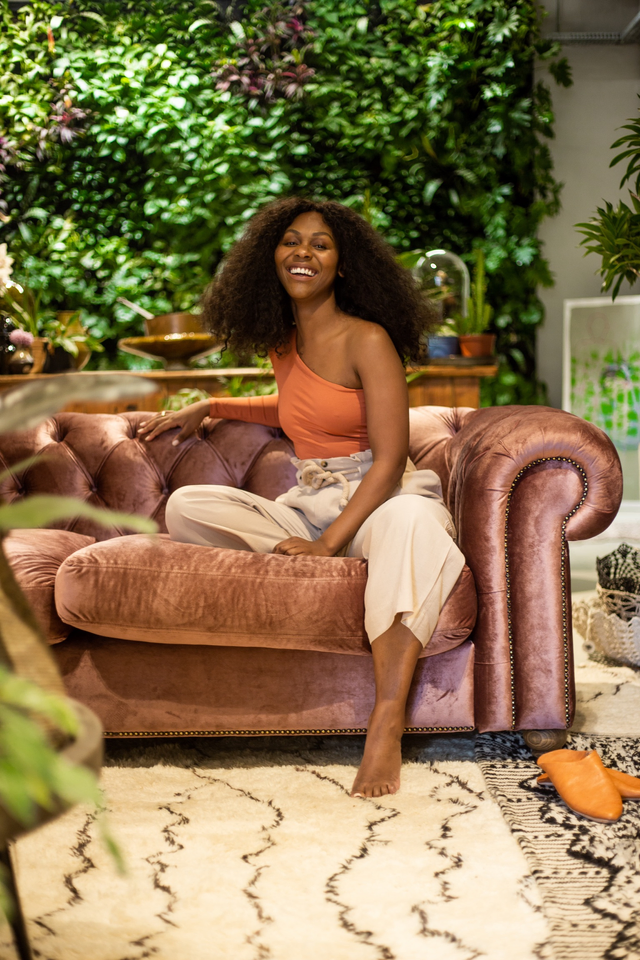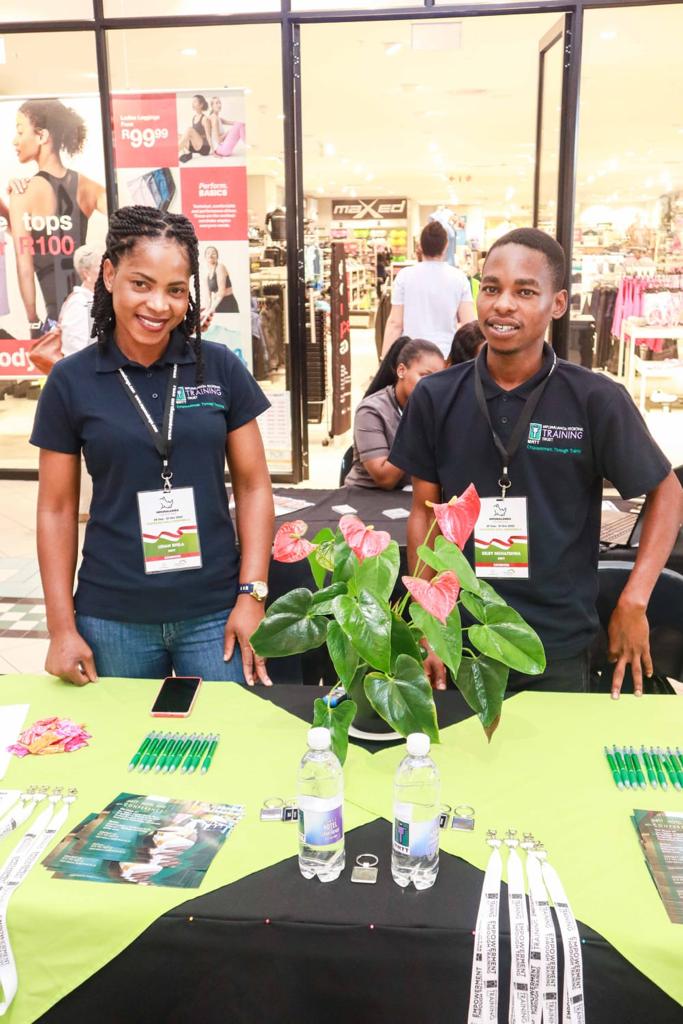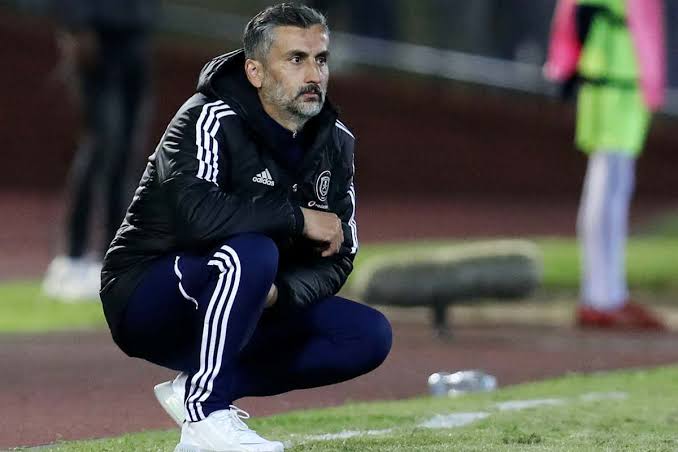If you’ve ever found yourself amidst one of her legendary soirées, you’ll know that Nandi Dlepu has a knack for curating unforgettable experiences. Yet, there’s more to Nandi than her reputation as the life of the party. She’s a media mogul in every sense of the word, and her journey from Gqeberha in the Eastern Cape to the bustling streets of Johannesburg is a story worth telling.
Born and partially raised in Gqeberha, Nandi’s path led her to Makhanda for her school years before setting her sights on Johannesburg for high school, college, and most of her professional career. She also had a brief stint living in Cape Town. Her journey into the world of media and storytelling began informally during high school, where she was part of a poetry collective and organized events. After high school, Nandi pursued her passion by enrolling at AFDA (film school). As a dedicated storyteller, she embarked on a career in the advertising and broadcast industries, initially focusing on design and advertising while moonlighting as an event organizer.
What drove you to choose this career path, and what inspired your journey into film school?
Storytelling has always fascinated me. Initially, I gravitated toward the more obvious career choices, like film or writing. However, as I grew older, I realized that storytelling is woven into every aspect of life. In parallel with my 9-to-5 job, which involved traditional storytelling, I found my true passion through The WKND Social. This project, created with five other women, was a pivotal moment in my life. It made me realize that curating and producing unique experiences resonated with my core being. Eventually, my passion project outshone my 9-to-5, and I had to follow my heart. After The WKND Social, I founded the Feel Good Series, and the rest is history.
How has your journey with the Feel Good Series been so far?
I find immense joy in everything we’ve conceptualized, especially the Feel Good Series. It’s unique because it began as a response to a brief from a property launch. Initially, it was just one event, but it grew into something much bigger. We created a platform for emerging artists, offering a space for talents like Una Rams, Zoë Modiga, and Langa Mavuso to shine. At the time, there were few platforms like ours. We were intentional, brave, and focused on nurturing talent rather than relying solely on big commercial headliners. It’s been an exciting journey.
So, is Mamakashaka the overarching brand for your ventures?
Yes, indeed. Mamakashaka is the foundation. It’s a marketing agency specializing in experience-led marketing. We have two parts to our business: our brands, which we started from our passions, such as Feel Good Series, Pantone Sundays, and Bloom, and our agency work, where we collaborate with other brands and clients.

How can aspiring talents be a part of your agency?
We’ve had people reach out to us with their CVs, expressing their desire to work with us. Many of the talented individuals on my team sought me out. We occasionally post calls to action on our Instagram when we’re looking for specific roles or skills.
What are your career highlights? Which moments stand out the most for you?
The journey itself has been a highlight. Simply starting was a significant achievement. My first full-time employee, Onta, marked another milestone. It was a moment of someone believing in this vision and taking on their first human responsibility. Emerging from the challenges brought by COVID-19 was another pivotal moment. Also, securing our first office space, which we call our HQ, was a significant achievement. It implies that I plan to grow even more in the future.

What are the major challenges you face as a Black woman in this industry?
Brand perception can be a challenge. People often misunderstand what we do and underestimate our services. Value perception can also be an issue. Sometimes, people don’t appreciate the value we bring to the table. Finding the right team members has been challenging too. It’s crucial to create environments that are compatible with the individuals you hire. My challenges are on brand perception sometimes. A lot of people don’t fully know what we do, a lot of people are always on some ‘oh you guys do parties’ and we’re like no we’re an experiential agency, parties are one of the things we do. Or someone will think we just do Feel Good Series or Pantone Sundays and it’s like no, we have Rupert and Rothschild, we have Nike, Spotify, we have all these clients. I think that sometimes, we’re an agency and we cast other agencies and we might not be as expensive as the bigger enterprises but we’re still an agency because I’m not a freelancer, so sometimes I think pricing, and people understanding and appreciating and paying for your value because we are good at what we do but there’s still this thing of oh it’s just Mamakashaka. No, this is a whole business with people.
How do you handle pricing negotiations with clients?
We have a minimum requirement to access our skill set, which is non-negotiable. However, we do pro-bono work when we believe in a project and have the capacity. Sometimes, we offer discounts for special projects that genuinely lack the budget.
Have you ever faced challenges where people tried to confine you to a certain image or persona that didn’t align with your authentic self? How did you deal with that?
I don’t know. I haven’t felt like someone was trying to make me smaller in a very long time that I can’t remember but I remember the feeling. But I haven’t had to go through it. Even in spaces where I’m uncertain I still say remember you were uncertain about that other thing and how you did there. So it hasn’t happened in a long time. But in times when it happens, I find it important to keep asserting myself and to keep showing up as authentically as possible.
In situations where I didn’t show up as authentically as possible, I tried using them as learning spells and figuring out what it was about this situation that made me shrink. So that I don’t shrink again. Because you know sometimes when you go through something embarrassing, you want to quickly bypass the experience, but you have to sit with that discomfort, take yourself out of it and understand how it got here. Which flags along this journey did I ignore? You want to onboard that lesson so that you can do better when it comes up again. So I try to learn from what got me there. When should I have said no? When should I have like asserted myself? You even playback the conversation and you’re like I should have said this when this person said that. So I think about it quite a lot.
Who are some of the women you look up to?
First and foremost, Oprah Winfrey. She’s inspiring to me on so many levels, on a business level, from a personal level and also a romantic level. Oprah in those three spheres of life is just for me, I’m very inspired by her holistically. I think to end the Oprah Winfrey Show and to go and brave a new path then fail dismally and publicly but continue is amazing. I think that being someone who has decided what her platforms should be used for and just how intentional she is. She is a great example of good doesn’t mean broke, and being ethical doesn’t mean broke. And from a personal relationship, I love her and Stedman.
Is that where you see yourself? You don’t see yourself walking down the aisle but you want to have a Stedman next to you forever?
It’s not necessarily that I don’t see myself walking down the aisle. It is just seeing women pursuing differently for themselves. I love the different types. It just gives you permission, it can be affirming, and it’s easier to accept yourself when you see versions of yourself out there. There was this wonderful article a friend shared of Oprah’s with me because we were talking about relationships and so on, but basically, she says in her 2020 O, the Oprah magazine letter she wrote: “I had doubts. I realized that I didn’t want a marriage, I wanted to be asked. I wanted to know he, Stedman, felt I was worthy of being his Mrs. but I didn’t want the sacrifices, compromises, the day in day out commitment required to make a marriage work. My life with the show was my priority and we both knew it”. She continued by writing: “he has individual personhood, he isn’t just Oprah’s man and they share the same important values. Because we relish in seeing the other fulfil and manifest their destiny and purpose”. And also Tracee Ellis Ross, so it was just nice to see another kind of relationship. It’s so wonderful seeing women embracing different types and exemplifying different journeys of womanhood. And what it means to be happy and successful as a Black woman and I simply love it for us. Because immediately after Oprah is Tracee Ellis Ross, she is someone I deeply respect and I love how she shows up in the world, I love the joyful spirit and energy that she exudes and I’m a huge fan artistically. So in terms of life vision, Oprah is my girl. In terms of personality vision, is Tracee Ellis Ross. And from a creative spirit point of view, I would say Solange. Solange is a woman whose creative being I deeply respect, her ability to transform and evolve in the ways that she has done permits me to try anything. My friends always joke that I can just decide that I am anything today and I expect everyone to be on board. So I just love Solange’s creative being and her ability to evolve and give herself permission to do it so many times in so many ways, I love that for her. And I’ve always wondered why I don’t have any local women but I think it comes from the fact that when I was growing up, they weren’t that evident. I know there are a lot of local powerful women and there are a lot that I deeply respect and admire.
So what’s your advice for younger women who aspire to be as great as you are?
I think it would start with understanding what it is that drives you. Sometimes we get inspired and then we seek to replicate and you will always be a poor replication of me but you will never be a poor replication of yourself. So the thing is about being the greatest pursuit is you. You are your wildest dreams coming true. You have to work on yourself. And I mean quite intentionally. I think I’ve always been a person who always worked on myself a little but I’ve always been astounded at how strong I’ve become, and how much more courageous I’ve been year on year. And being unashamedly myself and just accepting my quirks. For people, women specifically, to focus on themselves and not others. I’m always joking and saying “Yekani amadoda”, they’re still going to be there just work on yourself. There’s an overemphasis on romantic relationships but what should be emphasized should be the relationships we have with ourselves. And your relationships with your family. Then your relationships with your friends because these are people that you have accepted as family and you should work on those maybe down the line you can work on romantic relationships. I think we live in a world where romantic relationships are overemphasized and they’re not for everyone. You are for yourself. Your family and friends are for you.
What’s next for you? What can we expect in the future?
We’re excited about our latest venture, “Mamakashaka and Friends,” a curated space in Braam. It will host our events and collaborations with brands we deeply respect. We’re launching a talk series from Bloom and plan to celebrate with an opening party in December.
Follow Nandi Dlepu and catch the experiences she has curated for summer!







No Comments